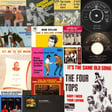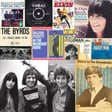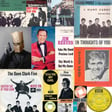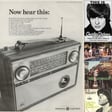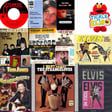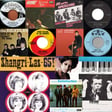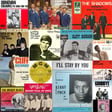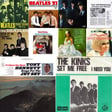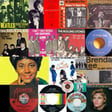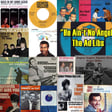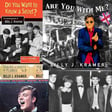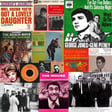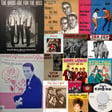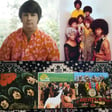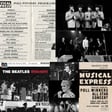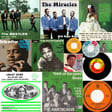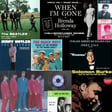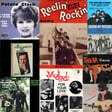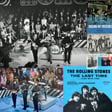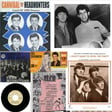Become a Creator today!Start creating today - Share your story with the world!
Start for free
00:00:00
00:00:01

August 1964 (side A)
We are joined by producer Shel Talmy (The Bachelors, The Orchids, The Kinks, The Who) to discuss his work as one of his most memorable earl productions hit the charts. We also move forward through the first two weeks of the British charts for August 1964. Create your podcast today! #madeonzencastr
Recommended
Transcript
The Beatles' Spirit Chant
00:00:00
Speaker
The Beatles had this chant, John Paul and George, and probably then Stuart and Pete, had this chant when things weren't going well, which in their world wasn't very often because mostly it was an upward trajectory, but nonetheless, sometimes, you know, they would have a bad night or the gig, you know, it didn't work properly or the amps broke or whatever. I say, where are we going, fellas? And they'd go to the top, Johnny. And I'd say, where's that, fellas? And they'd say to the top of most of the Papa most. And I'd say, right. And we'd all sort of cheer up.
00:00:31
Speaker
I'd say, where are we going fellas? And they go, to the top Johnny. I'd say, where's that fellas? And they say, to the top of most of the papamos. And I'd say, right. And we'd all sort of cheer on.
Introduction of Shel Talmy
00:00:57
Speaker
Welcome to August of 1964. Here on Toppermost of the Poppermost, I'm Ed Chin. I'm Kitto Toole. And I'm Martin Quibbel. Well, we have a very special guest with us this week. He's going to talk about some of his recording history and some of the acts that we've already covered in previous editions of the show. Why don't you tell us a little bit about them, Marv?
00:01:22
Speaker
Yeah, Shel Talmy is a record producer, very famous one. He's worked with Kathy Kirby, The Bachelors, The Kinks, The Who, The Nashville Teens, The Damned, The Small Faces and so many other bands that we've either touched on or we're most definitely going to touch on very soon, including this month. Incredible producer and me and Ed had a fantastic chat with him.
00:01:47
Speaker
Kit was not available but she has heard what you're about to hear and we will comment on it at the end before we go into our countdown for this first part of
Shel Talmy's Move to London and Early Career
00:01:59
Speaker
the month. Today we are very honored to be speaking with a guest.
00:02:03
Speaker
Our guest has been a producer on over 700 songs and worked with some incredible people. The list is just endless and runs the gamut of different genres.
Transforming The Bachelors
00:03:38
Speaker
but speaking with the producer, Shell Talmy. Thanks for speaking with us today, Shell. It is are delighted to be here. I'm happy to answer your questions if I remember some. Okay. Don't worry. Okay. So starting out, when you first went to England, you were a producer specifically for Jacka. And then you became an independent producer. Tell us about how you came to that idea and how you think that may have influenced the flu of forthcoming independent producers, including but not limited to George Martin. Uh, interesting question. I never thought of it quite that way.
00:04:19
Speaker
I got, and initially I went to London because um I was working at Conway Studios here in L.A. and the owner of Conway was English and he kept telling me how wonderful London was and I was able to visit it, which I had never done. I said, fine. And I said, I finally, I made some time and I said, ah I'm going to go for five weeks and and and you'll see what it's like and there's the parents and all that kind of stuff. And I told to my friend vicara Nick Vanay, who was the head of Capitol Records A and&R, and I said, yeah I'm going to try and work a couple of weeks. He said, here here's a couple of my estimates. I just finished telling you you did them. At that point, I was just basically
00:05:10
Speaker
training or had trained actually as a recording engineer and it just started to stop independently at Conway.
Talmy's Song Selection Method
00:05:20
Speaker
So um I came to London and again I had some contacts there at an appointment was to with Dick Rowett Decca and the two athletes that Nick had given me were Lou Rawls and the Beach Boys.
00:05:39
Speaker
And I played them both, and Dick said, you start today. And then, presumably, they decided to test me, and the first thing he gave me was the bachelors, or three harmonica players.
00:06:17
Speaker
I had them at my flat and pretty much taught them how to sing and who should be singing what and all that kind of stuff. and Then it' the first thing that actually Dick wanted me to do, which I did, was Charmaine. And that was a hit.
00:07:00
Speaker
I then started going... In fact, I was at this time already you discovered Denmark Street in London, and all the publishers, and I used to visit them a lot, and um chose other songs that were kind of in the vein of Charmaine, all of which turned out to be his, which was really pleasant. So I to then guess the word is, i ah It passed a test and that I knew what I was doing and carried on from there.
Working with The Orchids
00:07:32
Speaker
But the bachelors then, how did you take them from being that harmonica trio to how they would work as a vocal trio? Well, I stepped to the bottom line is that nobody was buying harmonica trios at that point in time. And I said, I think you guys need to start doing some singing. Otherwise, nobody's going to know who the hell they are.
00:07:54
Speaker
so um That's how that came about. And I said, I came up to my flat and we went through a whole bunch of situations of choosing who was going to sink lead and and and how to do harmonies and all that kind of stuff. And which fortunately worked out. That's great. e Okay, shortly thereafter, you were to work with a group of Liverpool teenagers called the Orchids. How did they come to you? And they were to record songs that you had written. How did that come about? Well, I wrote... ah i didn't write all I didn't write all the songs, but I did write some of them. The Orchids were ah brought to me by Larry Page, who recently has been deceased.
00:08:42
Speaker
and He was working somewhere were up north of here in LA and ah found the girls and started them singing. And he then called me and asked me to produce them. So i was I listened to them and I was delighted because they were really good. And I'm sorry that, in fact, I i continue to be sorry. They broke up as quickly as they did because they could have lasted for years.
00:09:10
Speaker
Yeah, I spent a lot of time with the girls. They were great, really nice. All three of them were terrific. And we chose songs and i some of which I wrote, other than which I didn't. And um we had we had a hit and there was there was a ah lot of fun. I liked them. I'm still in practice zone by the way, off and on. That's great. Oh, wow. Wow.
Talmy's Unique Production Style
00:09:30
Speaker
Now, related to that, there's a famous story about them appearing in the studio of Liverpool when the Beatles did their jukebox jury, and George Harrison commented that, oh, you know, it's it's a good record, but it sounds like what Phil Spector is doing. Can you comment about what you were hearing, you know, the wall of sound type thing, and how that then influenced your production style? No. Well, actually,
00:09:57
Speaker
I did nothing that sounded like what Phil Spector did, including the Wall of Sound, which Phil Spector didn't do. Phil's Wall of Sound was developed by the two guys at the studio he was working at, but not by him. um That's a story that I think everybody knows. So I think we can dismiss that. Whatever Phil did, what which included putting his name on songs he had nothing to do with, were not what I enjoyed.
00:10:25
Speaker
yeah But specifically, I mean, there is no question that Love Hit Me is in that, you know, niche-y production style. It just happened that's what you thought would fit their voices the best on that song? Yeah, certainly. I promise you, they had nothing to do with spectrum. They had to do with me listening to the girls and deciding on arrangements, which I did, and some of the songs that I wrote, and like that. That was my connection with how those songs got recorded, which no other interference involved there. Understood, understood, yeah.
00:11:02
Speaker
So it's it's a bit like ah it's a bit like I was saying with with Ed that that a lot of your production that I've listened to, it's it's as though you've you've listened to the songs or you've taken note of what the songs are, and then you've been sensitive to those songs and fitted a production that is the best to put that song over to the public, essentially. you You've picked a production or an engine or a style that fits with those songs.
00:11:30
Speaker
Well, that certainly was my intention from the get-go. And if it succeeded, then it made me extremely happy. Yes, that's pretty much the way it did. I've always done my own arrangements for pretty much everybody I've ever recorded, um which includes the Kinks, whose by the way, I've done over 100 tracks with the Kinks, by the way. Yes. And yeah, I mean, it's just that's, that's what I do. You know, I'm i'm a a record producer, and I'm happy to be one. And fortunately,
00:12:00
Speaker
I managed to make what I thought was going to be hit. And I'm still at it, by the way. So ah I have no intention of retiring. And what else can I, what next would you like me to
Missed Opportunities with The Beatles and The Rolling Stones
00:12:14
Speaker
tell you?
00:12:14
Speaker
e Okay, there's a quote which you have repeated a couple of times that when you went back to the States in 63, you were saying that you went around to try and get the British groups some traction in the States. ah and And what's reported is all I need is $5,000 and I can tie up every British group there is. I could have gotten stones for about 500, the Beatles for a thousand and everybody else for about $100 each.
00:12:45
Speaker
And they said it patted me on the head and and that was the end of that. I knew well that's that's pretty pretty much that is pretty much the way I thought about it. And what I thought was an actuality, unfortunately, because I didn't have a whole lot of money, obviously, is I couldn't find anybody who wanted to fund it. But I certainly could have tied all those bands up for not very much money.
00:13:12
Speaker
and unfortunately it didn't happen. What do you mean by tied up? I was trying to sign them so I could produce and unfortunately it ah didn't happen but not everything does. Well I mean do you think you missed out on the Beatles? ah You know obviously they had a great success and they are what they are in part because of George Martin and what do you think of George Martin? Not personally. I like George Martin a lot. He was a very nice guy. He was certainly a talent And what he did with the Beatles was extremely good. ah Certainly nothing bad to say about George Martin. He did a hell of a good job. He did that before I got started with where I thought I was trying to be. so
00:13:53
Speaker
All right, before we go into this list of songs, we got one more question. Can you comment on your thoughts on projects that either ended up getting either a limited release or didn't get completed in release at all? What we're thinking of in particular is the Small Faces record. Was Jimmy McCulloch on that, by the way? Jimmy McCulloch, the guitar from Wings, the guitar player? No. You know, do you remember?
00:14:19
Speaker
I don't remember, but I don't believe he was. I'm sorry, I could be wrong. right i'm I'm just not sure. You could probably find that on Wikipedia. I don't remember quite frankly. Okay, because they they they do comment him about him being there just shortly thereafter for some of those sessions. And then finally, the 74 Sensational Alex Harvey Band. Yeah. Comment just in general about your thoughts on lost record business. They were an unusual band for me in that For the first week I needed a translator because they were speaking pretty much what's called Gorbals English from you know where they were and I couldn't send it where I was saying so I needed a translator. And finally it sucked out what they were trying to tell me. so ah big and yeah nowe I had a lot of fun recording them. It's record banded.
00:15:14
Speaker
Again, nice and loud, which I liked. yeah So that that was fun. I enjoyed that. yeah And you work with the Damned as well. Interesting, because I was, quite frankly, not a punk fan. yeah But I met the Damned and they were really nice guys, which surprised me. And we got along very well.
00:15:34
Speaker
And we had fun and I would have been happy to do more but I had no i had no control over releases or anything like that. I did it for whatever the hell label I did it for, I don't remember now. And um it was out of my hands at that point. It's interesting that you'd work with the dams because sometimes when I listen to them you can almost hear a ah link or a line that that's there sonically that leads to them from the big sound that you got with the kinks and the who in the early 60s as well. you can almost hear that in their sound as well in the early days definitely. Well I'm i'm but now i'm glad you can because what I try to do on every record I produce is to make it totally clear lyric wise and as much as I can get out of it sonically and so if that came through with the damned I'm delighted that you said so. Thank you. Absolutely.
00:16:29
Speaker
Alright, let's start in on some of these songs. please Please feel free to say as much or as little or that you don't remember. I will tell you that if I don't. Okay, starting off with 1962, old Bill from The Bachelors. ah i Do I remember what it sounded like now? No. um The Bachelors, as in my opinion, was that they were testing me after I kind of BS my way in. And so they gave me the three harmonica players and say, you know, make something out of them. So that's why I got them. I taught them how to sing and pretty much and all the rest of
Significant Productions and Influence
00:17:12
Speaker
that stuff. i i I know the song Old Bill. I know I did it.
00:17:17
Speaker
Could I have it? and Hell no. I don't know. And then related to that, the there's two more bachelor's records we have on this list here, and you can say the same. ah No light in the window and the stars will remember. Any bigger comments? you know the The second one, I barely remember. The first one, I do remember. And of course, I had others that I think better. I wouldn't trade you for the world. and whispering in Diane. And Diane Buggler, which I just we recently learned, which I produced, was ah then claimed by somebody named Michael Barkley, I believe, as saying he did it. He did it out to it. I did. And I think I did a total um of maybe six or seven singles and then of course, plus the LP. And I did an EP with them also. That's great information because i what we do is we go through the charts from 60 years ago, both
00:18:14
Speaker
British and American. And we have just seen the success of Diane. And so it's great to know that you're the one who's actually behind it. OK, I love Hit Me By The Orchids, which you've already commented on. Right. Anything else to say about the Orchids? You know, James Wright, I think, as I earlier said, they were great. I really liked them a lot. And I'm sorry that all three of them became, they're all, by the way, very smart. One of them became a teacher, I believe.
00:18:43
Speaker
And, you know, it's something similar-ish, so I don't know. But I wish to help they'd stay together because I think, they in my opinion, they could have lasted for years. Secret love by Kathy Kirby. Kathy Kirby has got one of the great voices of all time, by the way. um Yeah, that no, that was just fun to do because of how well she did sing. Hey, guys, I'm sorry. I'm going to have to go. away I've had a bunch of calls I have has just come in while we're speaking, and I've got to get back and do some of this. ah So if you want to do this, if you want to do more of that, then that would be great. Do you ever have anything we can just just close out with? Okay, all right. Thank you very much. This takes us up through 1970-ish. you you know You've done, as you say, a lot of work over the last
00:19:36
Speaker
ah 54 years since then. Any just quick highlights you want to bring up before we then move on? I think you brought them all up.
00:19:47
Speaker
I can't think of anything we we left out of this, but however, if you want to take this up again at a later time, I have no problem doing that. Just today, I'm sorry that apparently I've been wanted by a half a dozen people. So I've got to get back to them.
00:20:06
Speaker
Wow. um No, no, no. yeah you've given You've given us an hour here and and that that is more than generous. It is. Thank
Versatility in Music Production
00:20:14
Speaker
you for that offer, Shell. We will take you up on that if that's okay on coming back to you and talking some more songs with you that we've missed out on. okay but No problem. it's Just let me let me know and we'll work it out. Okay. Thank you very much, Shell. Okay.
00:20:27
Speaker
Okay. Nice to speak to you guys. Take care. All right. Thank you. Take care. Bye-bye. If you're wondering why we said an hour with Shel Talmy, we did indeed record an hour with them. Although you only got about 15 to 20 minutes here. Some other clips will be included throughout this show and the entire thing will be available through our Patreon once we get it up and running.
00:20:51
Speaker
Yes, and ah wait for future episodes where we we will be pulling from this and other chats that we will be having with Shell potentially in the future. So Kent, what did you think of that? Shell's quite a character, isn't he?
00:21:05
Speaker
Yes, he is. He really yeah had a lot of interesting things to say. But, you know, what really struck me is just the diversity of the acts that he produced, particularly when he talked about the damned. I mean, here is someone who went from producing The Bachelors, Kathy Kirby, and then was equally as comfortable working with the damned, saying that he wasn't really a punk fan, but that he was willing to give it a try and actually enjoyed working with the group and you know working with their kind of music and said hey it was a job and he was willing to tackle it so really was so open-minded in the end to different kinds of music so I mean what a variety of styles that he worked with
00:21:56
Speaker
And really interesting to hear him talk about how he was about letting the artist shine. you know That was his production style. that That was his goal was to showcase the artist. And that's you what a producer does, right? I mean, that's what they are supposed to do. And so that was you know his style. That was his goal. And I think that's probably why he could work with so many different styles of music. And so you know working with everybody from The Bachelors to the who, to the kinks, we'll be talking about later in the show. So it was just fascinating to get that inside scoop on his style. and And boy, he sure could remember um so many of the artists that he worked with.
00:22:41
Speaker
I love that he took credit for Diane. I assume that he's correct. That's true. And yeah, I mean, really, yeah as I said, just just really a you know great memory of of so many of the people that he worked with.
Fondness for The Orchids
00:22:55
Speaker
And the other thing about The Bachelors is he was he was correct. They were indeed a harmonica band when they came to him. They were at that time known as the Harmonicords. Wow.
00:23:07
Speaker
Yeah, that's what I was about to say was that I was impressed with that with the the bachelors that he was able to take this just instrumental harmonica group and then perfectly mold them into a really good vocal group and be able to know which one would be doing the lead and which one would be doing each vocal and to be able to work them around to being such a good vocal.
00:23:29
Speaker
Another thing that struck me was he clearly still has great affection for and respect for the Orchids. you know that He really loved their harmonies and and had great respect for them as as singers. you know He really ah talked a lot and kept in touch with them.
00:23:48
Speaker
for many years after he worked with them. Well, he says that he's still friends with the orcas and that he still hears from them. Yeah, I thought that was really nice. I was really pleased to hear that.
Defining His Unique Style
00:24:00
Speaker
Although it was interesting for him to kind of deny that he was even influenced by Phil Spector and the Nishi sound there. I mean, you know, there's no question that record was a wall of sound production, whoever is responsible for the wall of sound.
00:24:14
Speaker
Mm-hmm. Yeah, I you know, probably I think all producers are very protective of their own style You know, I think they are are just very proprietary I think and I think that maybe part of that's where where that comes from that I think you know, he wants to be very protective of his own legacy and and his own sound. I mean, you know, I'm sure other producers, you know, maybe they would feel the same way. I'm i'm sure Phil Spector would feel that way if we could talk to him.
00:24:47
Speaker
Well, Phil is no longer with us for better or for worse. Yes, that is true. But that does take us into the other thing that we want to mention here up in our feature. On July the 25th, 1964, George and Ringo went in and each did a jukebox jury. George's was taped and aired the same evening. Ringo's was aired the next week.
00:25:11
Speaker
On that show, George said of the Crystal Song, well we'll read the songs that are they're there and we'll mention some of their comments later on, but what George said of the Crystal Song... I think it's youad full specre isn't it re well i think he's just about at his day i know with all this over du and i like the crystals, they got marvelous voices and all that, but I don't fancy it being a hit because, as they say, it sounds the same as everything else, which Phil Spector's produced over the last few years. Sorry about that. George is doing our apology bit. I wonder if Phil knows that he said that. I love when the Beatles run these Jukebox jury shows. They could just be savage. I just love it.
00:25:57
Speaker
and And who knew years later that they'd work together? It's like Tuppermost only 60 years earlier. Exactly. ah
00:26:09
Speaker
So the other guests on the panel that week, Alexandra Bastado, Reg Varney, and Carol Ann Ford. Carol Ann Ford being the very first companion on Doctor Who, a character who would later be played on radio by Jane Asher. Wow.
00:26:26
Speaker
Wow. I know all three of those people, by the way. So the songs that they covered on that jukebox jury were a cover of I Should Have Known Better by the Naturals, What Am I to You by Kenny Lynch, Soulful Dress by Sugar Pie DeSanto, How Can I Tell Her by the Foremost, Heart by David Nelson, Spanish Harlem by Sounds Incorporated, All Grown Up by the Crystals, the song we were just talking about, She's Not There by the Zombies, and Ain't Love Good Ain't Love Proud by Tony Clark. It's an interesting interesting mix. Yeah, a couple of those artists I'm not familiar with. So Ringo taped an appearance which was shown the next week. Joining him were Katie Boyle, Judy Cornwall, and Ray Martine. They voted on seven different songs. Thinking of You by the Dave Clark Five. A summer song by Chad and Jeremy. Don't It Make You Feel Good by the Overlanders. It's For You by Silla.
00:27:21
Speaker
Move It Baby by Simon Scott. I Wouldn't Trade You For The World by The Bachelors. Produced by Shel Talmy. And Not For Me by Sammy Davis Jr. The panel also reviewed a cover of Dang Me by Johnny Duncan. We know about Dang Me. Yes, we do. And The Fever by Jodie Miller, but the verdicts were left out of the broadcast.
00:27:41
Speaker
Oh, really? Yeah. I wonder why? Probably just ran too long. Interesting. So we will go back to some of their reviews as we go through, because some of those songs do indeed show up on the charts this week. They sure do. All right. Well, where we started, Shell Tell Me, there is no doubt one could do an entire podcast about Shell Tell
Zencastr Promotion
00:28:01
Speaker
Me. Absolutely.
00:28:02
Speaker
But how would you do that? Well, after two years of this show and many more with When They Was Fab, we believe Zencaster is the toppermost of the poppermost, see what we did there, for both production and hosting a podcast.
00:28:16
Speaker
Zencaster allows us to record each host and guest separately with recording saved to both the cloud and on the local devices of each participant. This greatly reduces the likelihood of signal degradation, lost files, and allows for the possibility of automated editing for those who prefer to let AI rule the worst.
00:28:38
Speaker
Once episodes are fully produced, they can automatically be uploaded to your feed with full online diagnostics and statistics. This applies to both audio only and video podcasts.
00:28:50
Speaker
With Zencaster you have everything you need to create, edit and distribute your podcast at an affordable price. Go to zencaster.com forward slash pricing and use the code TOPERMOST and you'll get 30% off your first month of any Zencaster paid plan.
00:29:10
Speaker
We want you to have the same easy experiences that we do for all of our podcasting and content needs. It's time to share your story. Okay, we move on to the first week of August, the week of July 29th to August 4th, 1964. At number one, it's a hard day's night, which stays at number one for one more week, then spends two weeks at number two.
00:29:40
Speaker
Still hanging around. Well, it's a little bit more than hanging around. Yes, that's true. I think we'll be seeing this one in the charts for a while. I think so. At number two all over now by the stones, which goes from two to four to four to seven. Another sticker. At number three, what Martin has euphemistically called I-J-D-K-W-T-D-W-M, I just don't know what to do with myself by Dusty Springfield, which moves from number three to number five to number seven to number nine. At number four, our old friends the Baron Knights with Call Up the Groups, which moves from number four to number three to number three to number five.
00:30:21
Speaker
At number five do i did he did he buy manford man no no police before or after it which was a number five to number two to two weeks at number one so it takes over from hard days night. Wow it's a hard days do what did it did it.
00:30:39
Speaker
At number six, Hole B by PJ Proby, which moves from number six to number 13 to number 18 to number 24 as it starts to slide down the charts. At number seven, House of the Rising Sun by the Animals, which moves from number seven to number eight to number 13 to number 22. At number 10, Tobacco Road by the Nashville Teens, which moves from number 10 to number six to number six to number six. Six, six, six, no comment there. Uh-oh, uh-oh.
00:31:08
Speaker
oh This has been on the charts but we just didn't mention it because we had too many songs last month. So Tobacco Road, it's a song we haven't talked about yet. Jimmy Page is on the guitar. Prominent piano. The guitar bass and drums are great. There's a dual lead vocal. Mickey Mouse produced. Good song, good harmonies. Not completely a garage rock song but it does rock and have a nice balance between edge and harmony.
00:31:54
Speaker
I've always liked this track. This is one of those songs that I didn't immediately recognize it from the title, but as soon as it kicked in, I thought, oh yeah, yeah, this one. I really like it. I think it has kind of a blues sound mixed with pop. Love the Jerry Lee Lewis inspired piano. heavily rhythmic guitar and, of course, the Jimmy Page guitar solo. And I love those long harmonies on the word road. It just has a really distinctive sound that still sounds good today. Still sounds different today. This is really a standout track. Yeah. And speaking of Jerry Lee Lewis, the Nashville teens backed up Jerry Lee Lewis at the Star Club for his Live at the Star Club record. Mm hmm. So that explains it.
00:32:38
Speaker
Wow, I think I was introduced to this song by, of all people, David Lee Roth. Really? Wow. Because he did a cover version of it. Hey, everybody. I have the unique honor of having Greg Bissonette here, who just out of the blue is into him today. I got one of the coolest gigs ever. I joined David Lee Roth's band that already had included Billy Sheehan and Steve Vai. And the first album that we did was Eat Him and Smile.
00:33:41
Speaker
No kidding. So you've got backing vocals by Greg and Billy on there that are really fantastic. And then I thought, oh, obviously a cover version. And I thought, where did this come from? So I did one of those rabbit holes, went down one of those, and that's how I came across this. So this must be nearly 40 years ago that I first heard this. It's obviously of the 60s, but also one of those that doesn't sound dated in any way either at the same time. It's got a great sound to it.
00:34:11
Speaker
Agreed. Yeah, that's what I think, too. It really doesn't sound dated. It really doesn't sound like it's from the 60s. Well, and the original was ah written and recorded by John D. Loudermilk in December of 1959 and released in 1960. So I mean, it's really actually a 50s song, not just a 60s song. Right. That's true. The B-side is a cover version of the Chris Kenna song. I like it like that. Oh. Which you co-wrote and co-produced with Alan Toussaint. It's a really good cover version of it as well.
00:34:41
Speaker
Nice. Oh, I'll check that out. And we have to mention that one of the members of the Nashville teams is a dead reindeer for Kit's nemesis, Austin musician and friend of ah when they was fab, Darren Murphy.
00:34:58
Speaker
I couldn't tell which one was Darren. Darren is currently playing in the Talking Heads tribute, but he could not just as easily be in a Nashville Tees tribute band. You still look like a teen, Darren.
00:35:16
Speaker
And for our Beatles reference, the Nashville teens appear in the film Pop Gear, which was known to us in the States as Gogo Mania. Oh yeah. The Beatles are also in the film, but their bit was lifted from The Beatles come to town. Some of the other acts in there, the poster does indeed feature five mop heads. We don't know who the fifth mop head is supposed to be, but some of the other acts in there are acts we know. Matt Monroe, Susan Mall, and the Animals, the Rockin' Berries, Herman's Hermits, the Four Pennies, the Nashville Teens, the Foremost, the Honeycombs, Billy J. Kramer, Peter and Gordon, Billy Davis, Sounds, Incorporated, Tommy Quickly, the Remo Four, and the Spencer Davis group.
00:36:03
Speaker
Nice. Wow. Is that worth seeking out then, Ed? It is available on DVD and Blu-ray, and I would guess it's available on streaming somewhere. I haven't gone looking for it. It's just a lot of performances. there's no There is no story to the film. It's just one after the other after the other. But if you want to see what some of these acts look like, there's a place to find out. Yeah, it's kind of a snapshot of the period. So that would be kind of cool to see. A bit like a 1964 Woodstock.
00:36:30
Speaker
There you go. And then to answer Martin's unasked question, the first place I heard of this was Madman. There's always a name in every partnership that defines who they are. In the case of Sterling Cooper Draper Price, would you say that's Donald Draper? Yes. Really? Last year, our agency was being swallowed whole. I realized I had two choices. I could die of boredom.
00:37:00
Speaker
or holster up my guns. So I walked into Lane Price's office and I said, fire us.
00:37:36
Speaker
At number 11, I get around by the Beach Boys, which goes from 11 to 10 to 8 to 8. At number 13, the version of wishing and hoping by the Mersey beats slowly on its way down from 13 to 14 to 15 to 17. At number 17, You're No Good by the Swinging Blue Jeans, which moves from 17 to 19 to 28 to 37, two songs in a row, which are inferior versions of songs that the ladies did much better. At number 20, Louis Armstrong with Hello, Dolly, which moves from 20 to 22 to 29 to 38. At number 22, Billy J Cramer with From Window, which moves from 22 to 15 to 12 to 10. At number 26, Light Dreamers Due by the Apple Jacks, aye aye aye, which moves from 26 to 30 to 37 to 41.
00:38:26
Speaker
ah Yeah, yeah. At number 28, Nobody I Know by Peter and Gordon, which moves from 28 to 32 to 37 before leaving the charts. Our next new song at number 33, Why Not Tonight by the Mojo's, which moves from 33 to 42 to 38 and then out of the charts. It's kind of got a Mersey beat based. It's a little bit of Jerry and the Pacemakers, but a bit more of Freddie and the Dreamers and maybe a little Dave Clark vibe, suitably intense drums, good vocals that border on being overdone. Kind of silly, but it's catchy. Why
00:39:21
Speaker
Please join the game but not wait. Please only keep it that way Please only keep it that way
00:39:38
Speaker
You kind of encapsulated there, Ed, what I didn't like about it, that it was Jerry and the Pacemakers, Freddie and the Dreamers, and Dave Clark Five. It was like they're trying to combine them all in one song and create a hit. It sounded frenetic in parts to me. It was sort of an overall mess. I just did not like this. I just thought it was all over the place.
00:40:01
Speaker
Just kind of like they were trying to plug in the different sounds of the time and then put them in a blender and created this song. Now I do like that one of the members of the group is named Terry O'Toole.
00:40:17
Speaker
um I I like that. So my brother Terry, no, no, I don't know. he Maybe it's a cousin. Maybe, maybe I'll have to go into ancestry dot.com and check it out. But other than that, I just really didn't care for this. And I will say that the lead singer, Stewart James, agreed with me.
00:40:37
Speaker
He said all with the benefit of hindsight you slam your foot on the break and say right. What have we really got for follow-up? Why not tonight was everything's alright written sideways. It really was it was completely contrived Everything's alright was there previous hit this was the follow-up which they kind of gave to the mind and we've seen Record labels do that to some of these various acts Exactly. They had this material foisted on them by their production company and everybody wasn't the Beatles and wrote their own stuff. I mean, unlike the Beatles who said, we're not doing, how do you do it? We've got our own material. Not all X could do that. So I'm not blaming them, but just didn't care for this at all. The other reason to mention Terry O'Toole. Terry O'Toole came to the Mojo's at the suggestion of one George Harrison. There you go.
00:41:27
Speaker
Wow. My man. All right. Yeah, several Beatles links, an amazing number of Beatles links actually between the Mojos and... Yes, indeed. Yeah. But um I'll quickly get my opinion of the song out of the way first, because I actually feel really bad about this, because I think I brought this to our attention, this group that they were in the charts. And I feel bad because I'm sort of along similar lines to Kit. There's these' bits that I like, but none of the bits seem to work.
00:41:55
Speaker
with each other, and there's one bit that really niggled me. Do you know the bit where it does all the stop-start syncopation? Yep. It's like the instruments have stopped starting at different points. Yes! They're not working together.
00:42:20
Speaker
Yeah, it's all over the place. Phonetic. Are they all playing different songs? Yeah, so that tells you my opinion. I mean, I think we're going to get the better songs from the Mojo's in the future. Now, Ed is going to give you an info dump. A couple things that we want to say about the Mojo's. In late 1963, the Mojo's went to Hamburg and they had a six-week residency at the Star Club. And that is, in fact, where they recorded their first big single, Everything's All Right. We record Everything's All Right in a church in Hamburg. I've always thought it was plucked from the heavens and it really sounded different on the radio. I thought that was something that Tom Hanks might have been pointing toward when he had the wonders record that thing you do in a church in that film.
00:43:04
Speaker
Ooh. And then in 1964, the Mojo's would feature a mass exodus as George Harrison's buddy and kiddo tools, cousin, Terry O'Toole, Keith Carlson, and Bob Conrad all departed from the Mojo's to form a band called the Epics. And confusingly enough, Terry O'Toole would later put together another band. He would also call the Mojo's. So there were two Mojo's running around in Liverpool for a while.
00:43:31
Speaker
Good old Terry. That's right. We old tools are always thinking. That's it. We're always up to something. But the revised version of the Mojo's would feature Lewis Collins, Ainsley Dunbar, Nikki Crouch, and Stu James. Some of those names are names that maybe not us, but our British friends will know. Let's start with Lewis Collins. Lewis Collins' dad was Bill Collins, and we will mention Bill Collins in a minute here. But in particular, Lewis Collins was a friend of Mike McCartney. Lewis Collins had been a drummer in a high school band called the Renegades at roughly the same time as Mike. So one day, as we know, Pete Best was, well, escorted away from the premises. So when Paul came home, Mike suggested that, hey, I got a drummer who's a buddy, Lewis Collins, why don't you invite him? Paul apparently went and talked to him, but Lewis even turned down the opportunity to audition for the Beatles.
00:44:35
Speaker
Wow.
00:44:38
Speaker
What could have been? Wow. It could have been a professional musician. So, Collins opted to continue drumming on a more amateur basis, playing for a number of local bands, including the I's and the Georgians. Collins quit hairdressing in 1964 to become the bass player, so no longer a drummer, he's now a bass player. Couldn't have done that for the Beatles. Although, you know, if it had been a year earlier, maybe Paul never would have gone to bass. They could have bought in Lewis Collins as a bass player.
00:45:06
Speaker
Wow. Wow. There's a book for somebody to write. Performing on their charting singles, Goodbye, Dolly Grey in 1967 and Until My Baby Comes Home in 1968, which we will run into in a little bit. Yeah. We will.
00:45:20
Speaker
Now, the father of Lewis Collins, Bill Collins, he was kind of a contemporary of Mal Evans. He worked around as a roadie for a lot of the Liverpool bands. Bill Collins would discover Welsh beat group, the Ivy's, who shared a bill with the Mojo's in spring of 1966.
00:45:40
Speaker
It is Bill Collins who would take them under his managerial wing. Collins moved the Ivy's to London England where they'd set a base at his communal house in Golders Green. The band was being paid about five pounds a week as a retainer, not a whole lot of money. He encouraged the band to focus on songwriting and frontman Pete Ham would take that to heart, demoing tons of original songs using the house's makeshift studio. Meanwhile the band continued to hone their live act performing a medley of R and&B, Motown and Beatles hits that soon began to draw the attention of a lot of record labels. Collins was insistent that the band signed with fledgling Apple Records, which was owned by the Beatles themselves. The label was known for being the most artist-friendly label at the time. By the next year, the Ivey's prepared demos for Apple Records and Collins invited his friend, Beatles roadie Mal Evans, to see the band perform at the Marquee Club. Once the demos were green lit, the Ivey's contract with Apple was secured and they became the first band signed to Apple records where they subsequently found success as bad figure. Yes, and the rest is history as they say. That's right. Now, Lewis Collins would then, as a lot of eagle-eyed or eagle-eared or what you would say for a podcast,
00:46:52
Speaker
british listeners would think with the name he would go on to become a very popular actor in the uk probably first becoming known for the sitcom the cuckoo waltz which was like a relationship sitcom in the mid 70s and then after that he would become an action star in the television series the professionals that rang for i think five years he was a really good actor and also very much into putting all he could in the park to the degree that he made a film about the SAS called Who Dares Wins, which is the motto of the tactical armed army force. And he wanted to be so perfect in the role that he actually went there and was trained by them for six months intensive training to do the part. Well, that's dedication. And they are real SAS soldiers that are like actually under the mask that do the action sequences with him in the films as well.
00:47:49
Speaker
Wow. Now the other name we mentioned from the Mojo's that you might be familiar with, Ainsley Dunbar from Liverpool was inducted into the Rock and Roll Hall of Fame as a member of Journey in 2017 and Rolling Stone named him the 27th greatest drummer of all time.
00:48:07
Speaker
Wow. Dunbar was the drummer for Frank Zappa, yeah playing on the solo albums, Apostrophe and Waka Joaka and the mothers of invention album, the grand wazoo film or East June of 1971 and just another band from LA. And he appears in the film 200 motels where Ringo appears playing Frank Zappa.
00:48:28
Speaker
And then Ainsley Dunbar was also part of the Johnny Yoko Frank Zappa show, which because we didn't get the Sometime in New York City box last year, we don't have as beetle people, but you can get the Frank Zappa version of it. Ah, missed out there. We needed that.
00:48:45
Speaker
Yep, that's all right. Alright, so that is the mojo. Much more about the mojo than you thought you'd hear. yeah That's right. Didn't love the song, but a lot of history. A lot of Beatles connections. We got the mojo working. That's right. I find the bad finger connection the most interesting thing of these actually. Well, that and the fact that Mike was working as a hairdresser with Lewis Collins. That's right. Yeah. Short back and sides.
00:49:13
Speaker
ah Okay, at number 35, You're My World by Silla, which moves from 35 to 40 to 48 to 44. At number 37, I Should Care by Frank Ifield, which just gets one more week in the charts at number 37 before it disappears. At number 43, Spanish Harlem by Sounds Incorporated, which moves from 43 to 35 to 36 to 42. This is one of these songs which George reviewed on that jukebox jury, as we mentioned at the top of the show. He rated it a hit, although his review seems to be more plugged for them because they're their friends and tour mates and had appeared on Around the Beatles with them. What he said was, Well, I think personally speaking, I think sound incorporated are the best instrumental group in Britain. and law but the thing is it's been out about three weeks anyway
00:50:03
Speaker
has't it i think it has anyway and it hadn't one anything yes but i hope it does cause i thing it's marvellous sound oh good go that day Very good. Acoustic guitar and cymbal dominated, it's pleasant enough but I think it's not quite as good as some of the other instrumental versions and there are lots of other instrumental versions.
00:50:23
Speaker
Yeah, I kind of agree. I think it obviously does not compare to the original Benny King version. This is pleasant enough as background music but that's about it. The sax solo was nice.
00:51:04
Speaker
I could have used more of that in the track, but otherwise pretty unremarkable. Yep, Kit has taken the words right out of my mouth. Nice to have in the background while you're doing other things. Of course, I'm more used to the Benny King version, which is a classic to my mind. yeah The saxophone thing. I like the saxophone, but if it was slightly changed and so that the saxophone was the main instrument and doing almost actually the melody to the song. Yes. As an instrumental. Once again, we agree. well King Curtis did an instrumental sax-heavy version of it. Okay. Was that before or after this? That was after this. and Okay. I need to check that out. Well, I mention it because, well, we are getting a supercut because it's a great song and we haven't covered it. And because George rated it on Jukebox Jury, some of the other versions that you will hear in this supercut
00:51:58
Speaker
Jay and the Americans, Pretty Purdy and the Playboys. We couldn't pass up a chance to include Bernard Purdy's band in a song here. Cool. Of course. Billy Joe Royal, Neil Diamond, Leon Russell, Percy Faith, Chad Atkins. A really nice guitar version of the Spanish Harlem. Lovely. King Curtis, Joe Lawson is orchestra featuring Elvis Costello's dad and Burt Whedon. Cue the music.
00:56:26
Speaker
At number 44, Handyman by Del Shannon, which moves from number 44 to 36 to 41 to 49. This was covered on the US s side. At number 46, You'll Never Get to Heaven by Dion Warwick, which moves from 46 to 25, moving up 21 slots there to 20 to 23. We also covered that in the US side. At number 47, Here I Go Again by the Hollies, which moves from number 47 to number 49.
00:56:54
Speaker
at number 50 once upon a time by Marvin Gaye and Mary Wells, which is only in the charts for one week at number 50 and without the next week, which we already covered on the US s side. oh Okay, we move on to the second week, the 5th to the 11th of August, 1964. As mentioned, Hard Day's Night is still at number one. At number 28, It's For You by Silla Black, which moves from number 28 to number 17 to number 13, a song written by Lennon McCartney. Mm-hmm. And actually written by Lennon McCartney as well, together. That's right.
00:57:31
Speaker
If you listen to one recording of a radio show, there's actually John Lennon introducing it and saying that he and Paul wrote it for Silla, and he introduces it on the radio show. Oh, wow. Hello, this is John Lennon of The Beatles. We'd like to play you a song now that Paul and I have just written, especially for Silla Black. Beautiful girl, a beautiful singer. Hope you like it. Here it is. It's called It's For You.
00:57:58
Speaker
I'm Len and McCartney are definitely trying to emulate Burt Bachrach and Hell David here. And in fact, I think Paul said this somewhere that they had used anyone who had a heart as the model for the song. Although, Sil Black later said that she felt it's for you didn't sound at all like anyone who had a heart. Although I have to disagree with her a bit that while maybe it didn't sound exactly like anyone who had a heart,
00:58:41
Speaker
I really think you can tell that they were trying to emulate Bacharach and David here from the chord changes to the rangy melody, the horns, I mean the strings. I just feel like you can hear some Bacharach-ish touches on here. To be honest, this has never been one of my favorite compositions of theirs. And I don't love Soul Black's voice on this. It's a little too brassy on some parts. And on this, the drumming I think is a little overdone in some parts of the track. ah The strings are nicely arranged.
00:59:17
Speaker
I do like that, but it's just never been one of my favorite compositions of theirs. Wow. So, yep, let the tomatoes fly, I know.
00:59:29
Speaker
Wow, we are in sync again. Oh, okay. Oh, I thought you were going to say, wow, you are so wrong. I listened to this and like you said, I like the strings. Yes. But it just felt to me like I was listening to the song and I was thinking they've written better songs and they would go on to my much better songs for Silla.
00:59:52
Speaker
Mm hmm. As well. Well, I mean, we have you have a snippet of the demo with Paul Singing. I actually agree with you guys. I prefer the demo to Silla's version. Yeah, I wish we have get the full version. We've only got about 30 seconds of it. Yep, I agree. It's for you to take one.
01:00:23
Speaker
It's for you, love. It is like, though, writing to a formula and not writing naturally. Right. If that makes sense. No, that's what I'm saying. I think they were trying to emulate Bacharach and David, and that's not their sound. That's not them.
01:00:40
Speaker
But it so it feels to me that then when they go from here and then they start writing the next song that they write, for for instance, is is is a cracker of a song. But that is when they're actually writing as themselves and not to a formula. Right. And that's when I think they're writing for anybody works best is when they're writing just naturally without trying to follow a format.
01:01:03
Speaker
to me it did sound like they were trying to copy Bacharach David to a degree just to have this standard feel to it. So we'll use this song, all these type of songs as templates and follow those. Exactly. And Bacharach and David were hot yeah at this point.
01:01:18
Speaker
And so they probably were thinking, OK, we're going to write something that kind of sounds like that, trying to follow trends. OK, we need to follow the sounds of the time. And they were writing for somebody else. And so they probably thought, OK, hey, this is what's selling. You know, they were like any other songwriters of of the time, even though they were Lennon and McCartney. So you can't blame them. You know, this was early in their career.
01:01:42
Speaker
And they they loved the writing of Bacharach and David because you know, things like Baby It's You and things like that, you know, because those sorts of songs. So, you know, so this isn't putting them down at all, but they were still kind of finding themselves. I mean, they were only a couple of years into their career. And I think they maybe be learned after this, no, we have to follow our own muse. Can't just imitate other people.
01:02:07
Speaker
And the production itself is a little bit all over the place, which Cilla kind of explains. ah The recording session was on the 3rd of June 1964, and they were going by Paul's demo, which we mentioned again, which we only have a little bit of. Cilla recorded the song at Abbey Road Studios on the 2nd of July with Martin producing the session. She recalled, that was some session. John and Paul joined me and George Martin.
01:02:30
Speaker
We made one track and then everyone had a go at suggesting how they thought it should be recorded. George said it should be one way, John and Paul another, and I then just added my own suggestions while they were thinking of what else they could do with the composition. That kind of explains why it sounds a little all over the place. Interesting.
01:02:48
Speaker
At number 30, like Dreamers do. At number 31, Happiness by Ken Dodd. At number 32, Nobody I Know by Peter and Gordon. At number 39, Can't You See That She's Mine, which is out of the top 50 after this week. At number 41, The Crying Game by Dave Berry, which moves from number 41 to number 21 to number 20. A lot of people that we are familiar with. Big Jim Sullivan played lead guitar. Jimmy Page was supporting and Bobby Graham was playing drums. The interesting thing about this record is that Sullivan experimented with a DeArmond Wawa pedal to change the sound of his guitar and this song is believed to be the first UK hit to feature that effect. Wow!
01:04:04
Speaker
I really like this song. I mean, the lyrics are just both eerie and sad, melancholy. This was so ahead of its time. I just thought it was it was written by Jeff Stevens, and he said he thought the main attraction of the song was the title. He said the title seemed the perfect seed from which to grow a very good pop song. Boy, was he right. ah He said that the sentiment of the song inspired the lyrics in the tune, which he said arrived in his head simultaneously. And he thought that one of his favorite lines in the song was, one day soon, I'm going to tell the moon about the crying game.
01:04:46
Speaker
Which is a great wine, isn't it? And he said, interestingly, the wine I know all there is to know was inspired by his father. And I think the end, that wine that repeats, don't want no more of the crying game that repeats over and over. It's just haunting. Love the chord changes in this, the reverb on Barry's voice. I know I keep saying haunting, haunting, haunting, but that's what it is. It just lingers with you. And I have to say, I also liked the early 90s version with Boy George. I really liked that. And that's actually the first version I heard. Okay.
01:05:23
Speaker
Yep, that was the first version I heard and I stupidly thought that was an original version. I didn't know for years that that was a cover. And it was produced by the Pet Shop Boys, I found out, and it's even airier than this version. And I loved it. And of course had no idea it dated from 1964 because it sounded so contemporary. And I just love this song. I love this version. I love the Boy George version.
01:05:50
Speaker
It's just timeless. Same. The B side is really great as well. It's a song called Don't Give Me No Lip Child. It features Jimmy Page playing harmonica, believe it or not.
01:06:01
Speaker
o Oh, rather check that out. And people generally know that song because it was covered by the Sex Pistols for the Great Rock and Roll Swindle. Oh, wow. Which is where I know that song from. And to prove that the Brits do not write the Cashbox Billboard style overly excited reviews, what they described this song as is an ultra-commercial, tuneful, over-echoed number with interesting slow guitar work and a good listenable tune. Emotional and extremely commercial with a very plaintative feel about it. Look at that. Brits, straight to the point, tell you how it is, none of this superfluous mishmash.
01:06:45
Speaker
flowery language, yes. And Adon Nickel in Disc described it as a slow, wistful ballad that has a gentle, intriguing background and a good top one. Yep. There you go. I agree with all of this and Jim Sullivan's use of the wah-wah pedal is inspired and just adds to it because it's almost like the guitar, for want of a better phrase, is crying.
01:07:09
Speaker
All right, at number 43, Chapel Love by the Dixie Cups. At number 46, that Francois Hardy song, which I'm not going to try and say. tu lagason at la fillilla There you go. Thank you. At number 48, Shout by Lulu and the Lovers. At number 49, here I go again by the Hollies, which all four of those songs are on their way out after this week. Here they go. And just because we're going to do four sides again this month, we're going to stop here for this week. Yes, indeed. Yes, with the interview and all these songs, we just had to create more sides.
01:07:49
Speaker
And also because we've got some of the most well recognizable songs from the 1960s coming up in Side B. Yes, we do. So join us soon for Side B of August 1964. Can't wait. See you then. Take care.
01:08:30
Speaker
There was a piece in the NME, a news piece, that said that Top Rank Records, remember when Top Rank had a record label? and They introduced an LP series next week that will be called Toppermost, and it's coinciding with their current advertising slogan, Toppermost of the Poppermost. Yes, and thought, they got it from someone.
01:08:51
Speaker
They saw that. They must have seen that in either the NMA or record mirror or disc, record and show mirror as it was then. And they've taken it from there. They've obviously thought how stupid that is. How stupid is, it's one of those phrases that someone, an older person who doesn't understand teenagers comes up with a slogan that they think is going to be the hip slogan of the month. Topper most of the popper most.
